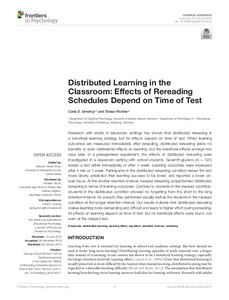Aufsatz

Distributed Learning in the Classroom: Effects of Rereading Schedules Depend on Time of Test
Zusammenfassung
Research with adults in laboratory settings has shown that distributed rereading is a beneficial learning strategy but its effects depend on time of test. When learning outcomes are measured immediately after rereading, distributed rereading yields no benefits or even detrimental effects on learning, but the beneficial effects emerge two days later. In a preregistered experiment, the effects of distributed rereading were investigated in a classroom setting with school students. Seventh-graders (N = 191) reread a text either immediately or after 1 week. Learning outcomes were measured after 4 min or 1 week. Participants in the distributed rereading condition reread the text more slowly, predicted their learning success to be lower, and reported a lower on-task focus. At the shorter retention interval, massed rereading outperformed distributed rereading in terms of learning outcomes. Contrary to students in the massed condition, students in the distributed condition showed no forgetting from the short to the long retention interval. As a result, they performed equally well as the students in the massed condition at the longer retention interval. Our results indicate that distributed rereading makes learning more demanding and difficult and leads to higher effort during rereading. Its effects on learning depend on time of test, but no beneficial effects were found, not even at the delayed test.
Zitierform
In: Frontiers in Psychology 2019, 9 (2019-01-09) , S. 2517 ; ISSN 1664-1078Förderhinweis
Gefördert durch den Publikationsfonds der Universität KasselZitieren
@article{doi:10.17170/kobra-20190204150,
author={Greving, Carla E. and Richter, Tobias},
title={Distributed Learning in the Classroom: Effects of Rereading Schedules Depend on Time of Test},
journal={Frontiers in Psychology},
year={2019}
}
0500 Oax 0501 Text $btxt$2rdacontent 0502 Computermedien $bc$2rdacarrier 1100 2019$n2019 1500 1/eng 2050 ##0##http://hdl.handle.net/123456789/11066 3000 Greving, Carla E. 3010 Richter, Tobias 4000 Distributed Learning in the Classroom: Effects of Rereading Schedules Depend on Time of Test / Greving, Carla E. 4030 4060 Online-Ressource 4085 ##0##=u http://nbn-resolving.de/http://hdl.handle.net/123456789/11066=x R 4204 \$dAufsatz 4170 7136 ##0##http://hdl.handle.net/123456789/11066
<resource xsi:schemaLocation="http://datacite.org/schema/kernel-2.2 http://schema.datacite.org/meta/kernel-2.2/metadata.xsd"> 2019-02-05T13:12:54Z 2019-02-05T13:12:54Z 2019-01-09 doi:10.17170/kobra-20190204150 http://hdl.handle.net/123456789/11066 Gefördert durch den Publikationsfonds der Universität Kassel eng Urheberrechtlich geschützt https://rightsstatements.org/page/InC/1.0/ distributed learning spacing effect lag effect retention interval rereading 150 Distributed Learning in the Classroom: Effects of Rereading Schedules Depend on Time of Test Aufsatz Research with adults in laboratory settings has shown that distributed rereading is a beneficial learning strategy but its effects depend on time of test. When learning outcomes are measured immediately after rereading, distributed rereading yields no benefits or even detrimental effects on learning, but the beneficial effects emerge two days later. In a preregistered experiment, the effects of distributed rereading were investigated in a classroom setting with school students. Seventh-graders (N = 191) reread a text either immediately or after 1 week. Learning outcomes were measured after 4 min or 1 week. Participants in the distributed rereading condition reread the text more slowly, predicted their learning success to be lower, and reported a lower on-task focus. At the shorter retention interval, massed rereading outperformed distributed rereading in terms of learning outcomes. Contrary to students in the massed condition, students in the distributed condition showed no forgetting from the short to the long retention interval. As a result, they performed equally well as the students in the massed condition at the longer retention interval. Our results indicate that distributed rereading makes learning more demanding and difficult and leads to higher effort during rereading. Its effects on learning depend on time of test, but no beneficial effects were found, not even at the delayed test. open access Greving, Carla E. Richter, Tobias doi:10.3389/fpsyg.2018.02517 publishedVersion ISSN 1664-1078 Frontiers in Psychology 2517 2019, 9 </resource>
Die folgenden Lizenzbestimmungen sind mit dieser Ressource verbunden:
Urheberrechtlich geschützt

